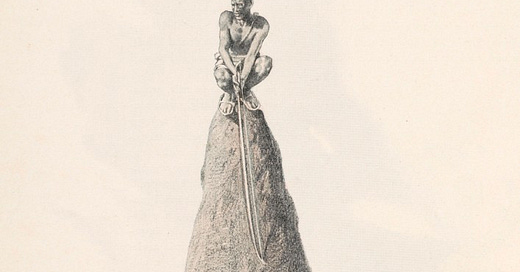Who are the Madhibaan/Madhiban? Part 1
Exploring the Identity and Challenges of the Madhibaan people.
Introduction:
The Madhibaan people are an ethnic Somali tribe native to the Horn of Africa. Despite being ethnically Somali, they have historically differed from nomadic Somalis culturally and linguistically. The Madhibaan have traditionally been skilled workers, traditional surgeons, doctors, nomadic, merchants, farmers, and hunters.
In this paper, we will explore the Madhibaan identities through their culture, language, and the historical and modern struggles they have faced. This exploration will provide a better understanding of who the Madhibaan people are and the challenges they have encountered.
Name; Magac
The Madhibaan people have historically had different names, and as a minority, they have struggled to maintain a unified identity due to oppressors vilifying their names. The name "Midgan/Midgaan," which will be referenced frequently, is a notable example. Historically, this name was the preferred self-identification of the Madhibaan people until the 20th century, when it became heavily stigmatized to the extent that it meant "those who don’t enter heaven," highlighting the extent of anti-Madhibaan sentiment in Greater Somalia.
The name "Midgaan" has been the primary identifier for the Madhibaan people, with the earliest known mention dating back to 1445 by Al Mahri Ibn Majid during his travels to Zeila. The significance of the name "Midgaan" warrants a dedicated discussion to better explain the anti-Madhibaan sentiment in the Horn of Africa.
The meaning of "Midgaan" has been a topic of debate among different scholars and observers, but one plausible theory suggests that the name could signify "one-hand." This interpretation likely relates to the Madhibaan people's historical reputation as skilled artisans and workers, often using their hands in various trades. This definition was also referenced by Richard Burton in his book "First Footsteps in East Africa" published in 1856, during his exploration of Harar.
On the other hand, the name "Madhibaan" is more straightforward in its meaning, as it translates to "those who don’t bother." This designation reflects the peaceful and non-confrontational nature traditionally associated with the Madhibaan people.
Understanding the Madhibaan/Madhiban Identity
The Madhibaan people have existed for centuries, developing a unique identity, including a distinct dialect known as Af-Collawa, which is also spoken by other Gabooye groups (Yibir, Tumal, Muse, and others). This dialect has its own elements that set it apart from Af Somali in various ways.
Here are a few examples comparing English, Af-Collawa, and Af Somali:
Woman(E)-Janaqta(C)-Dumar(S)
Man(E)-Janaq(C)-Nin(S)
Water(E)-Qabowsiimo(C)-Biyo(S)
Meat(E)-Rihiin(C)-Hilib(S)
Brave(E)-Tubaadige(C)-Geesi(S)
Large(E)-Yahaan(C)-Badan(S)
These words illustrate the differences between the two dialects, although they also share many similarities. Some consider Af-Collawa to be a sub-dialect of Af Somali. For example, the word for water in Af-Collawa is "Qabowsiimo," which can be translated to "Hydrating" in Af Somali. "Qaboow" means "Cold" in Af Somali, and "simo" can be understood as "filling."
Culturally, the Madhibaan people have maintained a distinct identity separate from other Somalis. This differentiation stems from the historical social disassociation of the Madhibaan people from the broader Somali community. For instance, Somali identity was traditionally divided into two categories: Saab (comprising Madhibaan, Yibir, Muse, Tumal) and Samaale (encompassing the dominant groups).
Within Somali society, the Samaale were regarded as "Gob" (meaning "Noble"), while the Saab were labeled as "gun" (meaning "non-noble"). This distinction reflects deeply ingrained social hierarchies and perceptions that have shaped the Madhibaan people's unique cultural identity.
In Part 2 of this discussion, I will delve further into this historical context, elaborating on the significance of this identity division and its broader implications within Somali society.




Looking forward to your next writing
My *